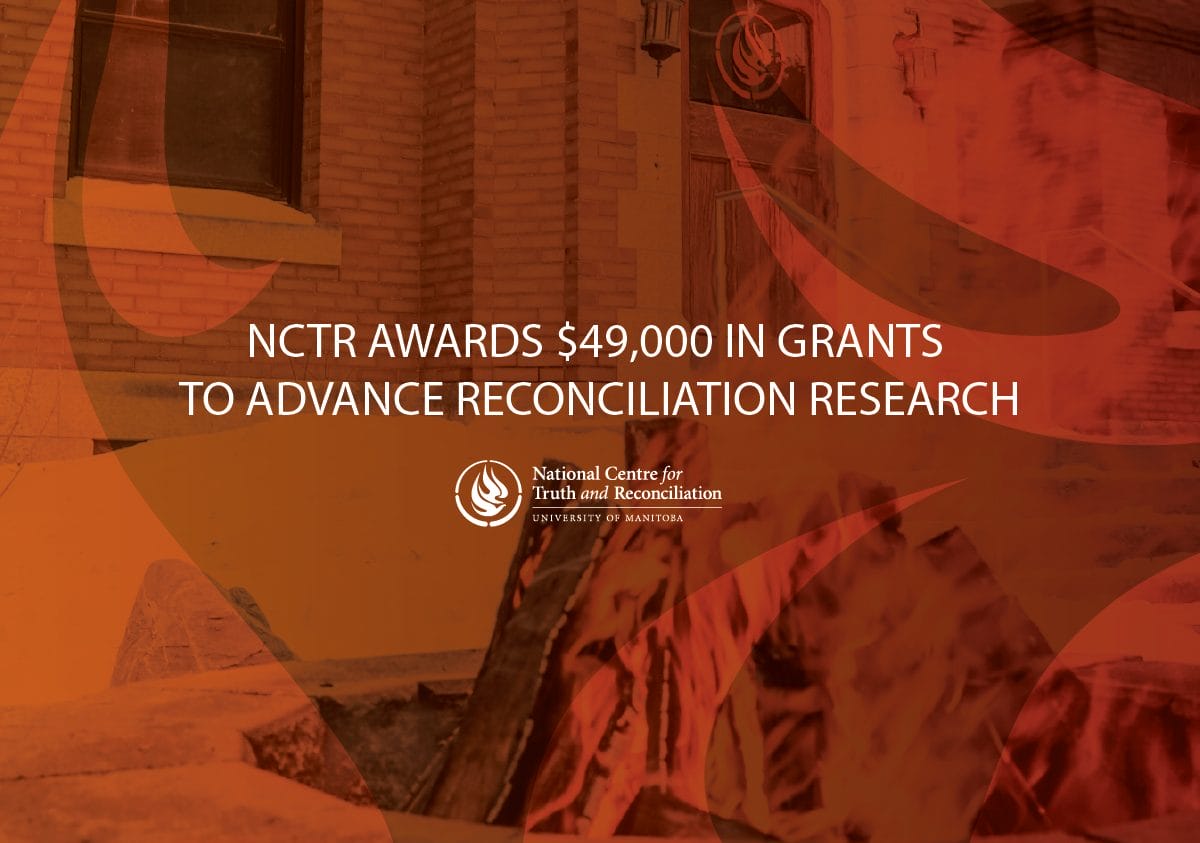NCTR awards $49,000 in grants to advance reconciliation research

WINNIPEG — The National Centre for Truth and Reconciliation (NCTR) has granted research funds as part of its Small Research Grants Fund. Recipients will receive up to $7,000 each for their research, and represent seven institutions including University College of the North, Vancouver Island University, Queen’s University, Thompson Rivers University, the University of Lethbridge, the University of Calgary, and Carleton University.
“We are proud to support the work being done by researchers, as it will help continue to uncover the truth about the residential school system,” said Stephanie Scott, Executive Director of the NCTR. “As we learn more, we can also work to bring traditional approaches and knowledge into the research process to the benefit of everyone.”
The purpose of the Small Research Grants Fund is to support the current focus areas of the NCTR’s research:
- Truth: Gaining a broader understanding of the history of the residential school system (including non-IRSSA schools, day schools, ‘60s scoop, Metis peoples’ experiences), as well as intergenerational impacts
- Indigenous peoples’ cultural revitalization, including Indigenous peoples’ self-determination, knowledge systems, oral histories, knowledges, languages, perspectives, methodologies, laws, protocols, and connections to the land
- Addressing the ongoing legacies of colonialism and residential schools including the impacts of the education system, cultures and languages, healthcare system, child welfare system, justice system, and economic opportunities and prosperity
- Closing the gaps in social, health and mental health, and economic outcomes that exist between Indigenous and non-Indigenous Canadians
Information on the recipients continues below:
Dr. Ying Kong and Dr. Joseph Atoyebi
University College of the North
The recipients will create two theme-based issues of the Muses From the North (MFTN) journal on Truth and Reconciliation. The publication of the two theme-based issues of the MFTN journal on Truth and Reconciliation will address various topics such as Indigenous language and culture, Indigenous identity, connection to the land, and the residential school system. Students will be provided a platform to reflect, express, and document lived experiences in education, housing, health, childcare, and employment.
Dr. Patricia Johnston
Vancouver Island University
The recipient will examine child welfare, with a focus on two communities as case studies in Nunavut. This work will seek to produce an academic article that details the actions, decisions, and considerations that informed the historical Community Transfer Agreements initiation and dissolution. Dr. Johnston will also share archival findings with Arctic communities, social workers, and the wider public.
Dr. Jackson Pind, Dr. Theodore Christou, Dr. Jennifer Davis, and Rebecca Carnevale
Queen’s University
The recipients will initiate research on the usability and effectiveness of map making in teaching Indigenous history education. The project will focus on creating accessible curriculum resources that will provide a national overview of the Indian Day Schools’ locations, religious partnerships, and length of operation. This tool will serve history and social studies educators at various levels of learning, particularly in public and secondary school public education, where Indigenous history is mandated across the country.
Dr. Alexis Brown, Roxanne Letterlough, and Jackie Jules
Thompson Rivers University
The recipients will incorporate traditional ecological knowledge (TEK) in Grade 11 and 12 science curriculum, developed in partnership with knowledge keepers. Expected outcomes from this research project include a local curriculum model for science educators that supports cultural revitalization, self-determination, knowledge systems, language, and connections to the land; enhanced collaborations between multiple stakeholders within the community including TRU, the school district, and T̓kemlúps te Secwépemc Museum; enhanced research methodologies and practices; and student training and skill development.
Dr. Tiffany Prete
University of Lethbridge
The recipient will conduct an archival research study that utilizes the NCTR archives to explore, reveal, and record significant aspects of the Blood Indian Residential School history. The goal is to uncover stories of the Blood children who attended the colonial sanctioned schools on the Blood Reserve. The findings will be of significance because it will be the first time that a Blackfoot researcher, using an Indigenous research methodology, will record this area of history.
Professor Alexandra Giancarlo
University of Calgary
The May 2021 announcement of up to two hundred unmarked burials at the site of the former Kamloops Residential School caused an unprecedented outpouring of sadness. For some Indigenous people, an additional form of response arose— they began to walk. Largely independent of one another, most of these groups were spearheaded by residential school survivors and inter-generational survivors. The project looks to understand what drove survivors and intergenerational survivors to undertake long distance walks upon the announcement of unmarked burial sites. It will then aim to incorporate and identify the healing aspects of those walks into community programming.
Dr. Laura Hall and Chrissy Isaacs
Carleton University
In the TRC’s Calls to Action, #41 addresses the need to find root causes to and remedies for, violence against Indigenous women and girls. The subsequent Inquiry into Missing and Murdered Indigenous Women expands on this analysis, calling us all to attend to a crisis rooted in the heteropatriarchal nature of colonialism. There remains a need to address the land-based, economic and cultural needs of Indigenous women and 2SLGBT communities. The project will expand on a series of seed projects focused on addressing and ending violence against Indigenous women and 2SLGBT people. This work will culminate in a presentation at the University of Toronto and Carleton University and an academic publication to be completed in Fall 2022. There will be a new call for proposals in 2023.
-30-
For more information:
media@mediastyle.ca
